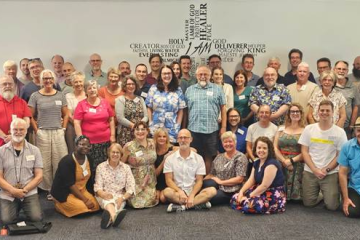Redefining King – John 18:33-
Two weeks ago, I was preaching at Seaforth Baptist Church – on Revelations 19. (As I mentioned last week your mission – should you choose to accept it – is to find an equally challenging passage for Christine Redwood to preach on when she visits CBC in January!) It is a passage describing God’s final victory over evil. “Hallelujah!” we hear four times, “Salvation and glory and power to our God….Hallelujah! For the Lord God the Almighty reigns.”
But what is so counterintuitive about the passage – counter to all the ways we see and understand the world to work – is that this judgement, this great final judgement, is not a judgement brought about by power or force (it is the voice of the great multitude who attribute power to God – who give God power). No. This great final judgement comes by the exercise of truth and justice.
Can we imagine that? In a world where terrorists attack civilians? In a world where armies relentlessly destroy cities and homes and people’s lives? In a world where more weapons and more terrifying weapons are constantly being employed? Can we imagine a leader who judges the world by truth and justice?
On this last Sunday in the church calendar, on this day that has been designated Christ the King Sunday, our Scripture reading presents us with a very different kind of leader.
This painting by Nikolai Ge, What is truth? Christ and Pilate, caused a scandal when it was first shown for its sacrilegious presentation of Jesus and yet what Ge is saying is this is how we are taken in by the leaders of this world.
Pilate is well dressed and commanding. Jesus is unkempt and unattractive, mockingly adorned in a purple robe and crowned with thorns. Pilate stands in the light. Jesus stands in the shadows. Pilate comes to us with a decisive plan for wiping out our enemies. Jesus imparts the strange message that his kingdom is not from this world, saying:
If my kingdom were from this world, my followers would be fighting to keep me from being handed over to the Jews. But as it is, my kingdom is not from here.” (John 18:36 NRSV)
For some, the words “my kingdom is not from here” is an indication that the kingdom of God Jesus speaks of is the kingdom in heaven – and life after death with God.
For others, however, this interpretation does not satisfy. In the ministry of Jesus – his healing and feeding and delivery of people from oppression and persecution – and how this ministry brings him into conflict with the leaders of his day – we see the signs of the very present and approaching reality of the kingdom of God.
When Jesus says then, standing in a Roman praetorium, the Roman headquarters, the symbol of Roman power and domination and violence, “My kingdom is not from here”, (“My kingdom is not from here”) he is redefining completely kingship and the modus operandi of his kingdom and its citizens.
“Were my kingdom made of the same stuff as yours,” Jesus is saying, “My followers would use the same tool for establishing and keeping power –the same tool of violence.” There is even a sharper parallel – hidden in our translation – for the word ‘followers’ in verse 36 is the same word as ‘temple police’ used in John 7 and – in conjunction with soldiers – throughout John 18 and 19. If my kingdom were from this world, my police would be fighting your police, my soldiers would be fighting your soldiers… Something very different is happening in kingdom of Jesus.
In his book, Christ on Trial, How the Gospel Unsettles Our Judgement, Rowan Williams writes:
Pilate has begun by asking Jesus if he is a king, and Jesus has answered that his royal authority is not the world’s kind, ‘not from hence’ in the old translation – i.e. either ‘not derived from this world order’ or ‘not of this sort’, the sort where people fight to defend a territory….To talk of kingship is to use the limited language of imperial administration. Use the word if you must, but remember that its content is utterly changed.
Jesus is a very different kind of king. For Jesus’ kingship is inseparable from the task, the calling, of embodying justice and embodying truth. When Pilate asks, “What is truth?” it is an indication that he has failed to recognise the truth standing right in front of him. The truth that God so loved the world that he gave his only Son… The truth that loving the world cannot co-exist with re-creating it through violence.
If we are to follow this very different kind of king, if we are to belong to this very different kind of kingdom what kind of citizens (what kind of soldiers or police) are we called to be?
For many in the early church the answer was that, like Jesus, they were not to use violence to defend themselves or to make followers or to usher in God’s kingdom. They scorned Roman religious traditions. They didn’t go to the games. They refused military service. And they were accused of political sedition because of their confession of ‘a kingdom of God’ and a ‘citizenship in heaven’.
Consider the poem of Origen (185–254), from Against Celsus, Book VIII, Chapter 73:
And as we — by our prayers —
vanquish all the demons that stir up war,
and lead to the violation of oaths,
and disturb the peace,
we in this service
are much more helpful to the kings
than those who go into the field
to fight for them.
And we do take our part in public affairs,
when along with righteous prayers,
we practice self-denying disciplines and meditations,
which teach us to despise pleasures,
and not to be lead astray by them.
And none fight better for the king
[and his role of preserving justice]
than we do.
We do not indeed fight under him,
although he demands it;
but we fight on his behalf,
forming a special army of piety
by offering our prayers to God.
A few years ago, after the terrorist attacks in Paris, Scott Higgins wrote a blog – Love my enemy? What fool suggested that? reaffirming that, even in the events of our day, Jesus calls us to love our enemies because this is how God treats enemies. God loves God’s enemies. We, as ‘God’s police’ cannot follow a different approach than the one we answer to, the one we emulate.
What would this mean, he writes:
At the level of my own personal response, I think Jesus calls me to refuse to participate in the retaliatory spirit that inevitably emerges at times like these. I think Jesus calls me to pray for the well-being of both the victims of terror and the perpetrators. What would love look like at the collective level? I’m not 100% sure, but I suspect it would mean we would try to understand our enemy…. Love operates with a simple maxim: you can do your damnedest, but I will meet every escalating act of violence with an escalating act of kindness.
Another Christian commentator, David Lose, writing from the Lutheran tradition, speaks of how God works through the temporal authorities, armies and police, on the left-hand and brings about the kingdom of God with the right-hand; the two-kingdoms doctrine. Standing in this tradition, he says, “I think the perpetrators of …violence …and terrorists everywhere should be opposed vigorously, fought tirelessly, and brought to justice whenever possible so that there is less such violence in the world.”
But David goes on to recognise inherent problem of using violence against violence, finishing with a quote from Martin Luther King, Jr:
The ultimate weakness of violence is that it is a descending spiral, begetting the very thing it seeks to destroy. Instead of diminishing evil, it multiplies it. Through violence you may murder the liar, but you cannot murder the lie, nor establish the truth. Through violence you may murder the hater, but you do not murder hate. In fact, violence merely increases hate. So, it goes. Returning violence for violence multiplies violence, adding deeper darkness to a night already devoid of stars. Darkness cannot drive out darkness: only light can do that. Hate cannot drive out hate: only love can do that.
Can I finish by telling you a dog story?
When Miriam had her bad frisbee accident, in February last year, I was staying with Dan’s mum in Bondi Junction to be close to Prince of Wales hospital and one morning when I left the house and was walking down Oxford Street, across the road a doggy day care – while a dog was coming in – accidently let two dogs out. They took off running, and they ran across the street, narrowly missed by cars. There were lots of people about, so we tried to catch the dogs, and one was quite happy to be caught, but the other one thought it was all a game and raced back across the street again – again narrowly missed by cars. And suddenly – all of us – all of us who were anxiously watching or trying to catch this dog – all of us suddenly realised the only thing we could do in this situation was to step onto the road – to put our bodies on the line – and stop the cars. And all together that is what we did. And the doggy day care person was able to collect the dog safely.
It’s just a story, but even as it was happening, it felt like I was in a parable – a kind of parable about how we might behave differently in our world – and the cost of that – but ultimately what that would mean for the redemption of our world.
We are called to be a different kind of people. We belong to a different kind of kingdom. We follow a different kind of king. One who overcomes darkness with light. One who overcomes hatred with love. One who overcomes violence by putting his own body on the line.
The kingdom of God is justice and peace and joy in the Holy Spirit,
Come, Lord, and open in us the gates of your kingdom.
Yes, Lord. Amen. Let’s sing this together.
Call to Worship (1)
We come as Psalm 96 say to praise our God – who reigns as king over all the earth.
To join with the voice of all creation “for he comes,
he comes to judge the earth.
He will judge the world in righteousness
and the peoples in his faithfulness.
Call to Worship (2)
Today is celebrated in the church calendar as Christ the King Sunday. As we continue in worship, let us think about the kind of king that Jesus is in this poem by Bruce Prewer.
King is your word not mine;
Friend I am, and not very choosey,
pagans and prostitutes,
publicans and sinners,
grace is my kingdom.
King is your word, not mine;
Servant I am, no one beneath me,
feet washer and waiter,
serving the least,
love is my kingdom
King is your word, not mine;
Physician I am, all free of charge,
touching the leper,
expelling the demons,
health is my kingdom.
King is your word, not mine;
A seer I am, seeing God’s word
in mustard seed and yeast,
wildflower and ravens,
truth is my kingdom.
King is your word, not mine;
Tradesman I am, honing my craft,
familiar with wood,
hammer and nails,
grace is my kingdom.
Prayer of Confession
This is the last Sunday of the church year. It ends today with a celebration of Christ the king and begins next Sunday with the start of Advent. And so today – as we reflect on the kind of king Jesus was – we are taken back to the story of his arrest in John’s gospel and his interrogation by the Roman governor Pilate. But before Ian comes to read us this passage, can I lead you in a prayer of confession.
Holding our lives before God
Jesus arrested, judged, found guilty
and condemned to die is held captive overnight.
If I were arrested and held this night
what would I be found guilty of?
That I made friends with people
irrespective of their place in society, their education or income
That I shared my bread with the poor…
That my words… and actions… brought healing and forgiveness…
That I made justice and didn’t count the cost…
That I sought the truth and then spoke of it…
That I recognised my neighbour
and loved them as my very self…
That I met God along the way
in the healing and forgiveness I received…
That I accepted hospitality at many different tables…
That I didn’t seek out suffering…
…but journeyed with it to the best of my ability…
God, you call us out of brokenness
to mend and remake your creation.
Grant us the courage to stay with, to stand with
all those who are held captive this night.
In the name of Jesus who is good news. Amen.
Prayers of Intercession
God of life, God of beginnings and endings,
today we pause to remember the power of death.
Today we tell the story of what happens
when someone angers those in power.
Today we tell a story of betrayal by a friend,
trial by empire,
execution as a way of silencing one who names injustice.
Today we tell a story that happened long ago in a land far away.
and that continues to happen today in places close at hand.
As we remember the story today help us to see its truth.
As we tell of Jesus’ trial and execution,
remind us of those who are punished for speaking truth.
remind us how easily we slip away
when the struggle for justice becomes dangerous or challenging.
remind us of the power of empire in any age,
and remind us of our duty as people of faith to proclaim a different empire,
a different kingdom, a new way of living together.
God of life and death, beginnings and endings,
today we remember those who live in places where peace is just a word,
not a reality, not even a dream;
those who live with nothing so that others may live with abundance
those who are struggling at the margins of our society, pushed to the margins
because of their social standing or income or education or race
or any of the countless other ways we find to set people apart.
God of our lives, we bring you our church this morning:
our desire to follow you,
our efforts to build an inclusive and caring community here,
our commitment to share your love and your justice in our words and actions.
We also bring you those who are on our hearts today:
Judith and Richard, as they recover from surgery, Jean Daly, Tara’s mother and her cancer diagnosis, Edna’s sister, Silvie, as the doctors work out how to improve her health and my nephew Harry as he had surgery this morning.
We bring you these concerns and the other concerns of our hearts
…time of silent prayer…
Loving God, we bring you these prayers in the name of the one who showed us
the depth of his passion for your Kingdom,
who taught us to live in love,
in whose life, death and resurrection we find the path to Kingdom living,
and who taught his friends to pray by saying:
Our Father, who art in heaven…
~ posted by Rev Gord on his blog, Worship Offerings. http://worshipofferings.blogspot.ca/
Offering Prayer
In this world: kingdom living.
In our mouths: kingdom praises.
In our hearts: kingdom goals.
In our hands: kingdom gifts.
Thy kingdom come,
thy will be done on earth as it is in heaven! Amen.
~ written by Carol Penner, and posted on Leading in Worship. http://carolpenner.typepad.com/
Commission & Benediction
Let love be genuine.
Hate what is evil, hold fast to what is good.
Love one another with deep affection,
thinking of others more highly than yourself.
Serve the Lord with zeal.
Rejoice in hope.
Be patient in suffering.
Persevere in prayer.
And may our Lord Jesus Christ Himself and God our Father,
who loved us and by His grace gave us eternal encouragement and good hope,
encourage your hearts and strengthen you
in every good deed and word. Amen.


